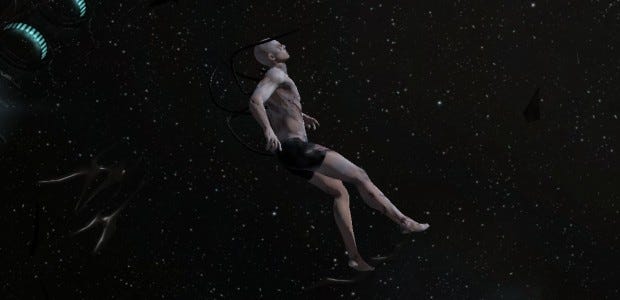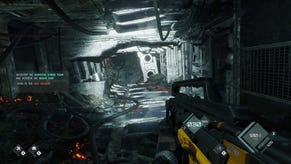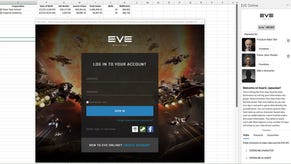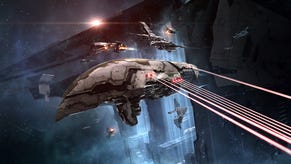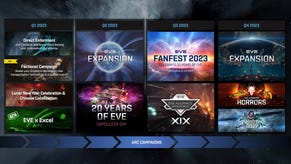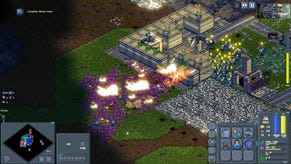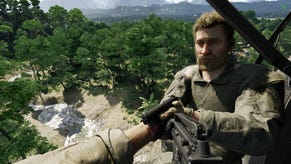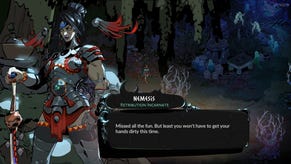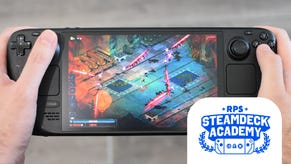EVE Online Diary Part One: Spaceships And Supermarkets
Warped Drive
Rich Stanton has been playing EVE Online. In the first of a three-part diary series, he explains the tools and apps he uses to make sure he never wastes a minute of valuable space time.
It is often said, and not without justification, that EVE Online is more of a spreadsheet simulator than a space game. At the very core of this magnificent creation are the spaceships, and shooting from them are not lasers and missiles but tables and text; endless columns of statistics that nestle in your monitor's corners and burst forth with inelegant bravado. For everything in EVE Online, and this game is as dense as a concrete fruitcake, there is an explanation that leads in multiple other directions. This bewitching and bamboozling universe swallows unwary players whole.
Steam tells me that, as I sit down to write this article, I've logged around 110 hours in EVE Online. I have absolutely no idea what I'm doing and – I really want to emphasise this point – that is not false modesty. This is a game of such awesome scope that of those hours I'd estimate at least half have been spent in stations; browsing the local markets, reading up on my latest discoveries, or simply trying to work out why I can't fit a particular gadget onto my ship.
This is what they never tell you about EVE: 80% of it is reading. Working out what a ship module does takes ten minutes. Reading up on suggested fits for your chosen frigate can take hours. Joining a decent-sized Corporation presents you with days' worth of notes to leaf through. And perhaps the most important thing for any new player to bear in mind is that you'll get a tonne of conflicting advice.
No wonder when the game launched it met with mediocre reviews – without the wealth of supporting material that now exists in and outside of EVE, forming any kind of opinion about this thing would be impossible without years of play. I usually take screens with the UI turned off. But to give you an idea here's one with it on, and this is a fairly common sight for me:
Best game ever.
One of EVE's most interesting qualities in this regard is that, the further you get into the game, the more stuff you acquire to track EVE while not playing the game. So over the last few months I've installed a standalone desktop application (EVEMon), acquired an RSS feed dedicated to EVE, and walk around with an app called Neocom on my iPhone – having tried out about four or five other options.
Probably the funniest feature in EVE, though of course it is VERY SERIOUS, is that the game has a fully-functional web browser built-in. So you never really have to leave – even though I mainly use it for reading up on EVE stuff, you could use it to check your gmail or order stuff from Amazon. But to get back to all of the supporting applications and material, what is it all for?
Although the spreadsheets gag is by far the most common, the more accurate charge is to describe EVE as Skillqueue Online. Your skillqueue in EVE is a thing of quite uncommon beauty and complexity, but based entirely on a 24 hour timer system that is designed to pull players back into the client as often as possible. This might sound like EVE's equivalent to levelling, but it's much more involved than that business – of course it is.
Here's how it works: you can train skills after you've 'injected' them from a skillbook, which you can only do in most cases when prerequisites are met – so you can't train 'Light Missile Specialisation', for example, without having first maxed out 'Light Missiles.' The killer detail is that everything trains in realtime, and does so even when you're not in-game.
Each skill has five levels, and the first will take minutes and the last will take weeks if not months. So I'm currently training Cloaking and rounding-up I can see that Level I takes an hour, II is 4 hours, III is 22 hours, IV is 5 days 4 hours – and I can't even see what V is. A good one for the holidays, I suspect.
The twist of the knife in this setup is that your queue can only be ordered for the next 24 hours, and although these API-based tools like EVEMon and Neocom can read your character info they can't write back to the client. So you can set up a 4 day skill no problem, and check the progress, but you can't set one to follow it without logging in with less than 24 hours 'training' left. At first this forces you to log in almost every day, because you're training low-level skills that don't take long, though over months it becomes a less frequent chore.
But that notion of time becomes crucial to how you 'play' EVE – any real world minute when your character isn't training is a wasted real world minute. I'm deadly serious. I've been at the supermarket when I've checked Neocom and seen I need to be home in an hour to put a new skill on. So fuck the puy lentils.
There is a saying popular among fans of the game, and it's impossible to gauge how much self-knowledge it contains: 'EVE is real.' Because in the sense that it's part of your day whether you play it or not, EVE is real. Here lies part of the true purpose behind the multitude of non-game applications. Whether you're talking about the leaders of mega-corporations, miners in high-sec, wormhole pirates, or noobs like me, we all share the same passion for efficiency. Not one wasted second.
It's easy to forget, I suppose, that this is a game about flying spaceships. Because while it's true that an EVE veteran with a few days' training could destroy a fully skilled-up player who had no idea what they're doing, it is also true that your investment in the game is shared across both hours spent and months subscribed.
More than anything else it's a change in mental conditioning. What astounds me about EVE – and continues to blow my mind nearly every time I log into the game – is just how far the vision behind this universe goes. I find that in-game web browser such a telling little kink; an acknowledgement that, because every aspect of the game is such a rabbit-hole, you'll often spend hours simply reading.
EVE, if not quite real, does feel permanent. With certain games like Team Fortress 2 and Counter-Strike GO, I look at my inventory with a degree of satisfaction because – rightly or wrongly – I feel that those things will always have value for me. I'll always want to play those games.
The whole of EVE feels like that. A sense that it's worth having these skills, it's worth stashing frigates in out-of-the-way stations, it's worth not pissing too many people off. It's worth taking care of your investment. Because I know that today, tomorrow, and the day after, EVE will always be real.
In part two, this Friday, Rich goes out to shoot some stuff.
